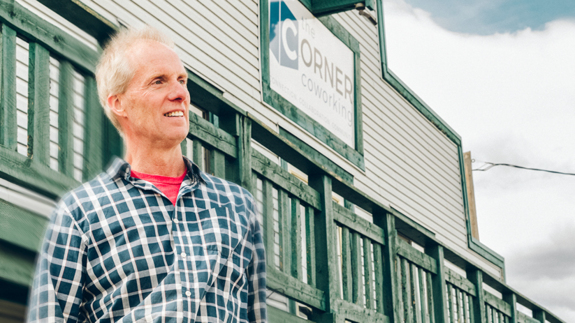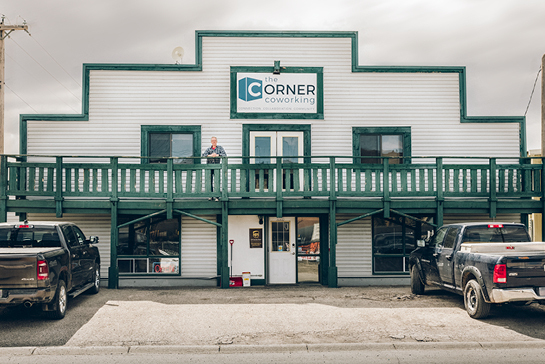A small business gets its green on

It’s the quiet that Mark Eaton now notices.
He owns The Corner Coworking, an Alberta-based company that provides shared office and warehouse spaces on a membership or on-demand basis. Three buildings are in Cochrane, a half hour northwest of Calgary, and the fourth is in Okotoks, the same distance south of Calgary.
Over the years, Eaton has made several changes to his four buildings to lessen their environmental footprint. “We had those typical four-foot fluorescent tubes that would buzz and flicker,” he recalls. “Changing our lighting was a must.”
Instead of the buzz and flicker, the new LED lights emit no sound and can dim to give his clients a new sense of quiet in their workspace.
Eaton also installed occupancy sensors that light up when a client (each with 24-7 access) walks into a meeting room or warehouse space—these also shut off the lights when no one is there. The other energy efficiencies include smart thermostats that lower temperatures when the office or warehouse is unoccupied, appliances and outlets that power down when not in use and smart locks that activate the lighting and heating.
Thanks to these efficiency upgrades, we don’t have to be onsite to manage the space. A member can let themselves in with a code, and the lights and heating come up. It saves my team a lot of time.
Mark Eaton
Owner, The Corner Coworking

Energy efficiency is just the start
One of the benefits of implementing these changes is the money the coworking space has saved. According to a 2024 BDC survey of 1500 building owners, 62% of those who carried out green renovations saved on their energy bill.
“We covered the cost of our thermostats within three months,” says Eaton, adding that money is not the only motivator. “It’s about doing the right thing. Investing in the energy efficiency of my buildings is just another climate action I take, along with recycling, composting and trips to the eco-centre.”
Besides the energy savings, the move to more sustainable office and warehouse spaces has modernized The Corner Coworking. While cowhides and barn wood still lend a small-town Western feel to the spaces, the buildings have been transformed into autonomous facilities.
“Thanks to these efficiency upgrades, we don’t have to be onsite to manage the space,” says Eaton, one of three staff. “A member can let themselves in with a code, and the lights and heating come on. It saves my team a lot of time.”
The system also sends warnings of potential problems. “If we have a furnace go out, I’ll get a notification that it’s been trying to heat for the last couple of hours,” he says, recalling a burst pipe shortly after opening one of his facilities six years ago. “If that happened today, an alarm would notify me rather than a customer.”
Because the system is more autonomous, new coworking clients require little onboarding. “We don’t have to walk them around and say, ‘Here’s where you turn the lights on and here’s how you adjust the heating.’” He feels this has led to an improved member experience, where his clients can simply enjoy the workspace. “They’re here to get their work done or do some networking.”
The consumer products are reliable and lower our costs, and I can control most of it from my phone or a tablet.
Mark Eaton
Owner, The Corner Coworking
Small changes can make a big difference
Green renovations don’t all need to be big commercial-grade endeavours; sometimes small changes, like the ones Eaton decided on, are easy to make and lead to significant benefits.
Eaton says his operation benefited from more affordable and readily available consumer products. “Why would I pay $300 for a smart light switch when I can do the same thing with one that costs $30?” He says there is little risk in not using commercial grade. “I’m not running a town reservoir. This would be different if I had a 40,000-square-foot place. But these spaces are 5,000 square feet or less. The consumer products are reliable and lower our costs, and I can control most of it from my phone or a tablet.”
Entrepreneurs may want to ask themselves similar questions and decide if they can use simple consumer solutions for their green retrofits.
Greened each space six months after moving in
The Corner Coworking’s greening was not all done in one fell swoop. The business was launched with one building in 2018 and, as each new coworking space opened, Eaton and his colleagues began to recognize areas for improvement and energy efficiency. They would typically start the retrofit six months after moving in.
Some of the challenges lay in matching older facilities with new technology. Their warehouse space, for example, has a basic radiant heater that blows a flame down a metal tube. The tube then heats up and spreads the heat throughout the space.
“This is not designed to run with a smart thermostat,” Eaton says. “But we worked with one of our members who’s an electrician.” The member, who stores his supplies in the warehouse, used some of them to solve the challenge and make the two seemingly mismatched pieces of equipment fit together.
The Corner Coworking does not own its buildings. As a tenant, it is limited in how much it can renovate. “We’re not going to be buying a new furnace,” says Eaton, but adds that the changes he has made have benefitted his business and shown goodwill to the landlord, something to have in his back pocket when it comes time to renegotiate a lease.
On the one property where he has a flexible lease based on revenue, retrofits offer more of an incentive for property owner involvement. “The landlord is more motivated to have a high-quality property because it directly affects their income,” he says, explaining that a property owner who invests can increase earnings from having a space that’s attractive to more people and decrease the amount spent on inefficiencies.
The silence of success
Eaton plans to open more coworking spaces and says the energy efficiency lessons he has gained are now ingrained in the way he works. The green retrofit also allows him to economize and standardize operations despite his buildings differing from one another. “When you’re across multiple locations, that’s where you start to see some real savings.”
The system that gives him early warning signs of something going wrong with one of his spaces has lately been quiet. He has also not heard any complaints from tenants.
“It’s like you can judge the success of the place based on the silence—no one is telling me that they couldn‘t get the lights to work or the heating to come on.”
Not hearing from tenants about anything going wrong with his coworking spaces is another kind of silence that Eaton now appreciates.